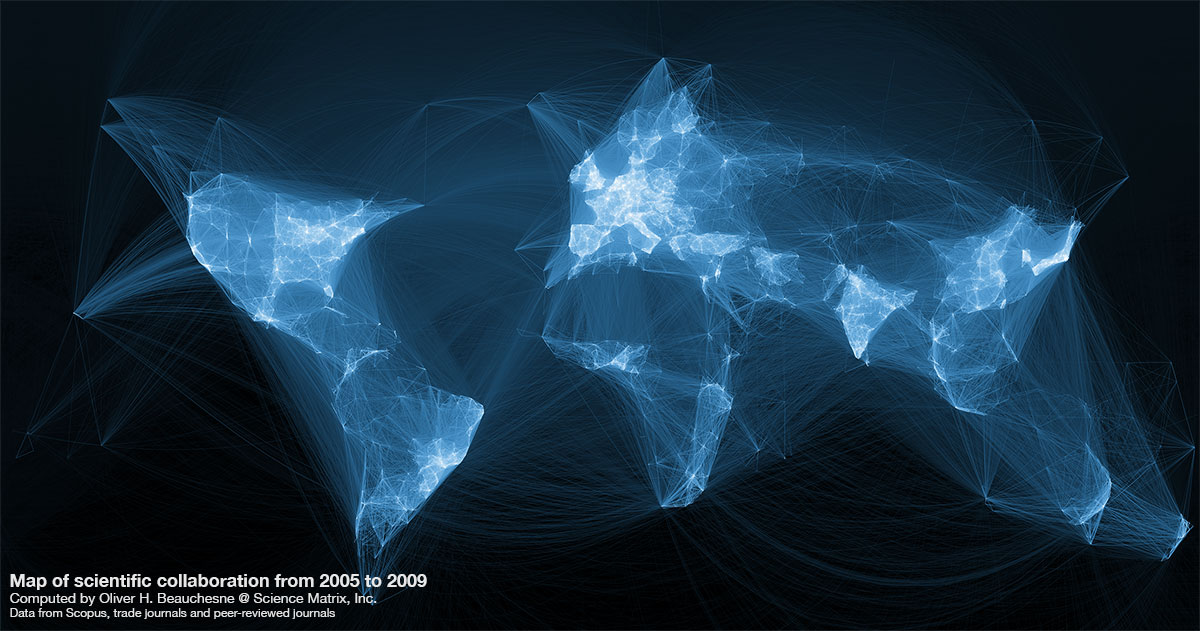You have /5 articles left.
Sign up for a free account or log in.
What are the implications for universities, and their governing boards/trustees/councils, of becoming increasingly embedded in global networks?
There are many implications, including the ability to be interconnected with flows of knowledgeable people (aka human capital), ideas, money, technologies, and so on. These global networks also ensure that international collaborative research and co-authorship occurs, a phenomenon explored on a number of levels in these fascinating reports:
- UNESCO Science Report: Towards 2030
- OECD Science, Technology and Industry Scoreboard 2015 Innovation for growth and society
- Ocean Science in Canada: Meeting the Challenge, Seizing the Opportunity
- Knowledge, Networks and Nations: Global Scientific collaboration in the 21st century
Pause for a moment, too, and explore this fascinating visualization by Olivier H. Beauchesne of indexable co-authorship between 2005-2009:

What political boundaries, if any, do you notice in this empirically-based visualization of collaborative activity?
It's no surprise if you read the reports flagged above that governments and funding councils across the worlds are enamored with facilitating more international collaborative research. Why? It is perceived to enhance the quality of the knowledge produced, the ability to address key global challenges, and that collaborative output (e.g., articles, reports, books) can generate relatively higher interest and impacts.
When I examine the above graphic, I think of all of my colleagues at the universities I've been educated and have worked at - the University of British Columbia, the University of Bristol, the National University of Singapore, Sciences Po (albeit just for one year), and the University of Wisconsin-Madison. At all of these universities I was (and am, in the case of UW-Madison) surrounded by colleagues who collaborate with colleagues in other universities, national and regional (e.g., European) research councils, firms, government agencies, international organizations, etc., all of which are scattered across the planet. Of course there is variation in researchers' individual collaborative geographies, but there is evidence of a progressive deepening and extension of global networks, and this is backed up by bibliometric research on the basis of Thomson Reuters and Elsevier data.
From a broader perspective, it's worth noting that these globalizing networks are structurally supported by the operation of segmented academic labour markets that are increasingly supra-national in nature, the digitalization of research infrastructures (think of research databases, publication platforms, the Global Research Council, ORCID, etc.), university internationalization strategies, global production networks (value chains), open access online higher education media, etc.
Now when things go well, universities benefit, as do the economies and societies (both territorialized) they are most closely associated with. Think, for example, of the myriad of ways the local, regional and indeed national economy benefited when one UW-Madison faculty member established the largest medical records company (Epic Systems) in the world, with offices in Verona WI, the Netherlands, and Singapore. When things go well, universities see increased attention from the higher ed media, and the business/economy-focused media (given the critically important role of universities in constructing vibrant knowledge-based economies). Said universities see higher positioning in world university rankings, increased flows of international fee-paying students, more diversity and competition in the make up of job applicant pools, more spin-off companies with genuinely global perspectives, greater competitiveness in extramural funding competitions, and so on.
As with many phenomenon, the existence of vibrant global networks that run through universities is a double-edged sword. They have the capacity to, if things go poorly, propel near instantaneous and surprisingly durable echoes and reverberations that span out across global space. Information flows, like water - it can't be suppressed. Epistemic communities care little for the complex causes of major budget cuts, the detailed factors underlying poor leadership, nor the diverse causes of governance ineptitude. These global epistemic communities, supported by mediatized services (e.g., via Twitter, Facebook, email), pay negligible if nil attention to detailed rationale and nuances of controversial policy shifts (e.g., about tenure and layoff provisions). These increasingly global epistemic communities treasure, above all, freedom of thought to produce innovative forms of knowledge in the search for truth, clear and evident autonomy from the interventive impulses of the state, church, society, and governance systems that are proactively supportive vs repressive/micro-management in inclination.
Unfortunately, while higher education, as well as the associated knowledge economy, is going global, higher education politics with respect to budgets and university governance (at the board/council/trustee level) is at risk of regressing, of becoming more local, regional, hyper-politicized, and ideological. Think, for example, about the messy local/provincial politics shaping key aspects of the University of British Columbia's ongoing leadership/governance crisis, or an evident regional agenda to mess about (a 'solution in search of a problem'?) with one of the foundational principles of academic freedom - tenure - that has built the University of Wisconsin (System), over a century plus, into what it is.
Going global brings with it amazing opportunities. Going global is a necessary developmental agenda for universities that seek to excel and build resilience in the 21st century. Going global is an integral part of supporting of regional knowledge-based economic development strategies, something I learned much about via colleagues on an OECD mission. But, hand in hand with going global is a global eye on the local.
Are those governing universities, and provincial/state higher education systems, as aware as they should be about the global networks that play a fundamental role in sustaining the vibrancy, effectiveness, and stature of their universities? If not, they should be, for local controversies and tensions are also simultaneously global in nature - they reverberate, at the speed of light, through global networks.
Kris Olds

